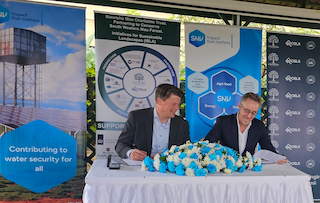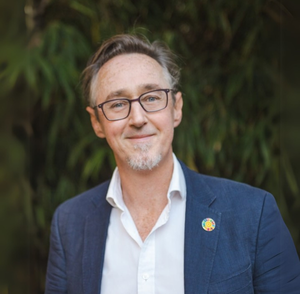From trade to transformation: IDH and SNV partner to build systemic resilience

Across the globe, a sense of momentum is building among stakeholders working to strengthen the resilience of energy, water, and agri-food systems. This shared determination is driving innovation and partnerships, even in the face of climate shocks, rising costs, and shifting development and trade priorities.
With over 295 million people across 53 countries experiencing acute food insecurity in 2024, the need for scalable, lasting solutions is urgent. The challenges demand new and better forms of collaboration amongst development actors: working together across sectors and stakeholders can amplify impact, strengthen supply chains, and drive innovation and where, and for whom, it is most needed.
It is against this backdrop that SNV and IDH have entered a new partnership, with a shared vision to align international sustainable development with the dynamics of global markets as complementary drivers of lasting change.
The partnership is designed to work across agri-food, energy and water systems, where pressures converge and where collaborative, systemic approaches—bringing together governments, businesses, knowledge institutions, civil society—have the greatest potential for impact at scale. By aligning strategies and harnessing our respective organisations’ relationships and sharing knowledge, expertise and resources, we aim to both generate efficiencies and generate greater impacts, contributing to a stronger, more resilient agri-food system. This will result in partnerships with farmers and communities on the ground whilst making global supply chains resilient, generating jobs, adding value, and safeguarding the natural environment.
Overlapping crises demand systemic responses
What happens on farms across the world is increasingly inseparable from what happens in boardrooms and supermarkets. The challenges facing our food systems go far beyond the climate crisis. They reflect how risk, value, and responsibility are shared, or not shared, across the entire value chain. Rising production costs, shifting trade regulations, and growing inequality are putting pressure on farmers and workers who cultivate, process, and transport our food. Many are questioning the future of their livelihoods. Consumers all over the world are also increasingly feeling the impact, from higher food prices to questions about the future availability of our daily cup of coffee.
These challenges call for a new approach. Not fragmented initiatives, but collaboration at scale for structural change. The SNV and IDH partnership is based on a clear conviction: increased resilience requires inclusive approaches that draw on the strengths of development cooperation, market innovation and public-private collaboration.
In this strategic partnership, IDH and SNV will combine their strengths to accelerate market transformation. IDH will develop and upscale new sustainable business models with market leaders, helping to expand them further by engaging other companies, investors, and policymakers. SNV will, complementing this, adapt and embed these models through its in-country expertise—ensuring that innovations are not only tested but also integrated into governance structures, market systems, and financing arrangements. Together, they turn innovation into lasting change, embedding new models in markets, finance, and governance to deliver long-term value for farmers, businesses, and consumers.
The pressures on food systems are intensifying, and interventions and partnerships must bridge local realities with global markets and finance. This partnership brings those elements together to embed resilience across supply chains, ensuring they can adapt to shifting regulations, rising costs and climate shocks, and remain viable in the long term.

The power of public-private partnerships, which are key to both organisations, is that we go for catalytic finance and shared value. By joining forces, we can scale innovation and drive real system change. This creates value for farmers, workers, businesses, and consumers alike whilst safeguarding the environment.

The collaboration imperative
Nothing illustrates the synergies between trade and aid better than coffee. Worldwide, climate change, water scarcity, and stricter sustainability requirements threaten the production of affordable, quality coffee. For millions of smallholder farmers, this is a direct threat to their income; for companies and consumers, it’s about supply security.
By collaborating with a range of private sector companies sourcing coffee from countries like Ethiopia, Vietnam, Uganda, and Rwanda, IDH and SNV, who are both working with coffee partners, aim through their partnership to scale sustainable farming practices, which lead to higher incomes for farmers, and more transparent supply chains.
In smallholder-driven coffee value chains, securing your supply isn’t a given. Through the Coffee Farmer Income Resilience program, farmers in Kenya and Uganda are improving their coffee yields and developing new sources of income from avocados, macadamia, and dairy.

Strong food systems depend on partnerships that align farmer resilience with business sustainability. In Vietnam, for instance, our collaboration with coffee company Tchibo is doing just that—supporting thousands of coffee farmers to improve practices, increase incomes and meet EUDR requirements, while strengthening the long-term stability of supply chains.

Examples like these illustrate the kind of approaches that the SNV–IDH partnership can scale—delivering practical outcomes on the ground and aligning with national priorities in the countries where we work.
In doing so, the partnership will contribute to partner governments’ ambitions for more resilient, inclusive and sustainable systems, support the Dutch agro-food sector’s strategic plan to strengthen public-private collaboration and supply chain sustainability, and align with priorities such as the EU Global Gateway and new regulations on deforestation and sustainability reporting. For companies, it can provide practical models that turn compliance into long-term resilience and competitiveness.

About IDH and SNV
Drawing on over 15 years’ experience, IDH has been working towards a future where farming and food production not only meet global demand but also create shared prosperity for people and the planet. Rather than going it alone, they are bringing together businesses, governments, civil society and knowledge institutions to work worldwide on environmental and economic resilience, creating practical solutions that make global trade more fair, sustainable, and inclusive.
SNV is a global development partner deeply rooted in the African and Asian countries where they operate. With 60 years of experience and a team of approximately 1,600 people, they strengthen capacities and catalyse partnerships that transform agri-food, energy, and water systems. Focused on the core themes of gender equality and social inclusion, climate adaptation and mitigation, and strong institutions and effective governance, they operate at the intersection of project implementation and systems influence. Strongly positioned alongside a broad network of trusted partners, SNV mobilises resources through innovative financing mechanisms, tailoring their approaches to different contexts to achieve large-scale impact and create sustainable and more equitable lives for all.